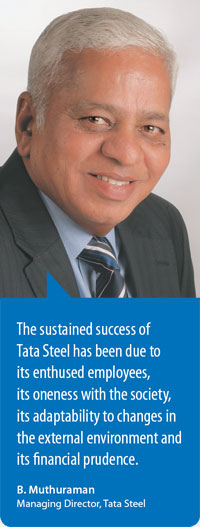Message from Managing Director, Tata Steel
Tata Steel turned hundred in 2007-08 – a hundred years of value creation for its stakeholders, of nation building, of service to society and of customer care. The sustained success of Tata Steel over one hundred years has been due to its empowered, energetic and enthused employees, its oneness with the society, its adaptability to changes in the external environment and its financial prudence.
Ever since 1991, freed from the shackles of administered control which had curbed competitiveness, innovation and growth for several decades, Tata Steel began a journey. The years 1991 to 2000 was a period of self renewal for Tata Steel - scrapping obsolete equipment and technology and bringing in new technology and equipment, initiating several improvement projects, severe cost control measures, initiating IT support systems for decision making, institutionalisation of better market and customer focus and sowing the seeds of changing mindsets. With all these efforts, Tata Steel, by the year 2001, had become one of the lowest cost producers of steel in the world and began to be recognised in the global steel industry. We had earned the right to grow.
The years 2000 to 2005 were years of intense strategic thinking about the company’s future, formulating and initiating plans for the company’s organic growth in Jamshedpur and initiation of greenfield projects in India - in the realisation of a strong demand growth in India and the beginnings of the larger role that Tata Steel could play in the global stage. Business processes were further strengthened, continuous improvements became embedded into the day to day work style, marketing initiatives were further strengthened in terms of branding and getting into customer value management and a systematic retail value management. For retail products, Tata Steel set up a unique distribution system, unknown in India till then. Tata Steel’s first overseas acquisition, that of NatSteel, based in Singapore, took place in 2004. So did the first overseas joint venture for coking coal in Australia. These were part of the strategic plan detailed out during 2000–2004. Memoranda of Understanding with the State Governments of Orissa, Chhattisgarh and Jharkhand for Greenfield steel plants in these states were signed during 2004 and 2005.
By 2005, Tata Steel was well on its journey. The acquisition of Millennium Steel in Thailand was a step in that journey. So were the setting up of Tata BlueScope Steel Ltd. to venture downstream into construction solutions and the formation of the joint venture with NYK for ocean logistics. The Corus acquisition, consummated on 3rd April 2007 was a major milestone in Tata Steel’s journey of becoming global. With this, Tata Steel, with a crude steelmaking capacity of 28.1 million tonnes per annum became the sixth largest steel company in the world with presence in several countries across continents.
Currently, the global steel industry is going through unprecedented times. The steel demand is strong with over 6% growth year on year over the last seven years – unseen in the last several decades, primarily driven by robust growth in China, India, South East Asia, Middle East, Russia and Brazil. The iron ore and coking coal prices are at a record high both due to insufficient capacity creation for these and the heavy consolidation of minerals companies. Oil prices and ocean freight rates are at an all time high. The combined effect of all these have driven steel prices to a level higher than ever before – though there is increasing pressure on margins of steel companies due to very high input costs.
The new scenario – both external, due to high raw material and freight costs and internal, called for a new Vision, strategies and action plans. The Company has co-created a shared Vision with its employees of becoming a global benchmark in Value Creation and Corporate Citizenship. We have set ourselves goals for 2012 in terms of Returns on Invested Capital, Safety, Carbondioxide emissions and of becoming the employer of choice in the industry. The integration with Corus is proceeding smoothly and is yielding better than the predicted results. Continuous improvement projects are being given focus in all our sites and businesses. Our Greenfield projects in India are progressing, though somewhat slower than planned. Our effort to enhance our raw material security has yielded positive results in Ivory Coast for iron ore, in Mozambique for coal and in Oman for limestone. There is greater emphasis on safety. We have well laid out plans to reduce CO2 emissions to benchmark levels.
The journey is on – Tata Steel is well and truly on its way to realise its Vision and its goals, with the central theme of value creation and corporate citizenship.


 Tata Steel turned hundred in 2007-08 – a hundred years of value creation for its stakeholders, of nation building,
of service to society and of customer care. The sustained success of Tata Steel over one hundred years has
been due to its empowered, energetic and enthused employees, its oneness with the society, its adaptability to
changes in the external environment and its financial prudence.
Tata Steel turned hundred in 2007-08 – a hundred years of value creation for its stakeholders, of nation building,
of service to society and of customer care. The sustained success of Tata Steel over one hundred years has
been due to its empowered, energetic and enthused employees, its oneness with the society, its adaptability to
changes in the external environment and its financial prudence.